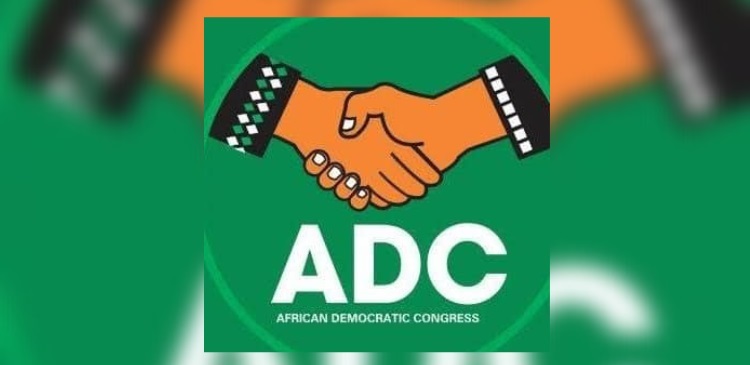As the African Democratic Congress (ADC) finds itself engulfed in a fresh wave of internal conflict, political observers are asking a critical question: Can a party divided against itself truly rise to challenge Nigeria’s ruling APC in 2027?
What was supposed to be a strategic repositioning of Nigeria’s third force has instead snowballed into a leadership crisis that now threatens to fracture the African Democratic Congress (ADC) before the 2027 general elections even take shape.
The party, recently adopted by the opposition coalition led by former Vice President Atiku Abubakar as a unified platform to unseat the APC, is facing fierce internal pushback. The emergence of former Senate President David Mark and ex-governor Rauf Aregbesola as interim leaders, announced without wide consultation, has triggered resistance from within ADC’s ranks, setting off a familiar pattern of factionalism, legal suits, and public discontent.
ADC’s Longstanding Fault Lines Resurface
The fault lines within ADC are not new. The party has struggled to maintain stable leadership since 2022, with rival factions and suspended executives routinely challenging decisions in court. But this current crisis, sparked by the Atiku-led coalition’s bold political calculus, has added a new layer of volatility.
National Publicity Secretary Musa Isa Matara and other prominent figures have publicly rejected the coalition’s “takeover” of the party, describing it as a “political hijack orchestrated by elite dealmakers.” At the heart of their resistance is a claim that ADC’s identity and internal democracy are being eroded in the name of political expediency.
“The ADC is not for sale. It belongs to its members, not power brokers,” Matara said in a fiery press briefing late July.
The dissenting faction has questioned the constitutionality of the interim appointments, arguing that the move bypassed party congresses and the National Executive Committee (NEC), both of which are required for any leadership change under ADC’s constitution.
Coalition Promise or Poisoned Chalice?
For opposition forces desperate to break APC’s stronghold, the ADC looked like an attractive option: relatively untainted, nationwide presence, and a structure that could be expanded with the right alliances. But the manner of adoption—without internal buy-in—may have turned a strategic opportunity into a public relations disaster.
According to political analyst Prof. Haruna Shehu of the University of Abuja, “What was meant to project ADC as a unity vessel for the opposition now makes it appear unstable and untrustworthy. If the party can’t manage its own house, how can it manage a national coalition?”
This legitimacy question could haunt the party’s chances in 2027, especially if legal suits filed by aggrieved members succeed in invalidating current appointments or upending the party’s strategy midstream.
A Party at War with Itself
The crisis reveals deeper structural weaknesses in Nigeria’s smaller parties. Unlike the APC or PDP, which have institutionalized power structures (despite their own internal issues), ADC has struggled to develop mechanisms for conflict resolution and leadership continuity.
The irony is sharp: a party once branded as a progressive alternative now risks becoming a cautionary tale of what happens when internal democracy is sacrificed for quick political gains.
Already, the legal minefield is widening. Courts are still attending to unresolved suits from previous crises, while new cases challenging the legality of recent appointments have further muddied the waters.
Meanwhile, disillusioned youth leaders, women’s wings, and several state chairpersons are threatening mass resignations or the formation of parallel structures if the leadership crisis isn’t resolved before the party’s national convention.
Fit to Challenge APC in 2027?
The short answer: Not in its current state.
Unless ADC urgently resolves its internal disputes, unites its factions, and rebuilds member confidence through inclusive dialogue, its dreams of becoming a viable national alternative in 2027 may remain just that—dreams.
What’s more, the APC, despite its own internal discontent, remains a well-oiled electoral machine. For ADC to even dent the ruling party’s dominance, it would require not just moral arguments, but massive grassroots mobilization, a strong and unified leadership, and a clear policy alternative. Right now, it has none of these.
What ADC Must Do
To survive this moment and mount a meaningful presidential challenge: Call a constitutionally backed convention to clarify leadership and prevent legal annulment; engage dissenting voices through transparent dialogue, not elite-driven imposition; rebuild grassroots credibility by putting internal democracy over quick political deals; strengthen legal standing by resolving legacy cases still pending from previous crises.
A Party on Fire Cannot Shelter a Nation
The ADC may have been handed a rare political opportunity, but the crisis of identity, leadership, and legitimacy threatens to burn it all down. In the high-stakes game of 2027 politics, perception is power—and right now, the ADC is looking like a party at war with itself.
Unless it resolves this leadership logjam soon, the question won’t be whether ADC can challenge APC—it will be whether ADC even makes it to the starting line.























